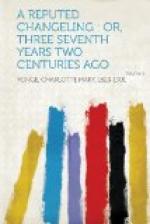The little fellow was very pitiful, and made her cry again by wanting to know whether she had gout like grandpapa or rheumatics like grandmamma, and then stroking her face, calling her his dear Nana, and telling her of the salad in his garden that his papa was to eat the very first day he came home.
By and by Dr. Woodford knocked at her door. He had had a long conversation with poor old Sir Philip, who was calmer now than under the first blow, and somewhat less inclined to anger with the girl, who might indeed be the cause, but surely the innocent cause, of all. The Doctor had done his best to show that her going out had no connection with any of the youths, and he thought Sir Philip would believe it on quieter reflection. He had remembered too, signs of self-reproach mixed with his son’s grief for his wife, and his extreme relief at the plan for going abroad, recollecting likewise that Charles had strongly disliked poor Peregrine, and had much resented the liking which young Madam had shown for one whose attentions might have been partly intended to tease the young husband.
“Of course,” said Dr. Woodford, “the unhappy deed was no more than an unfortunate accident, and if all had been known at first, probably it would so have been treated. The concealment was an error, but it is impossible to blame either of you for it.”
“Oh never mind that, dear uncle! Only tell me! Must he—must Charles suffer to save that man? You know what he is, real murderer in heart! Oh I know. The right must be done! But it is dreadful!”
“The right must be done and the truth spoken at all costs. No one knows that better than our good old patron,” said the Doctor; “but, my dear child, you are not called on to denounce this young man as you seem to imagine, unless there should be no other means of saving his cousin, or unless you are so questioned that you cannot help replying for truth’s sake. Knowing nothing of all this, it struck others besides myself at the inquest that the evidence against Sedley was utterly insufficient for a conviction, and if he should be acquitted, matters will only be as they were before.”
“Then you think I am not bound to speak—The truth, the whole truth, nothing but the truth,” she murmured in exceeding grief, yet firmly.
“You certainly may, nay, must keep your former silence till the trial, at the Lent Assizes. I trust you may not be called on as a witness to the fray with Sedley, but that I may be sufficient testimony to that. I could testify to nothing else. Remember, if you are called, you have only to answer what you are asked, nor is it likely, unless Sedley have any suspicion of the truth, that you will be asked any question that will implicate Mr. Archfield. If so, God give you strength my poor child, to be true to Him. But the point of the trial is to prove Sedley guilty or not guilty; and if the latter, there is no more to be said. God grant it.”




